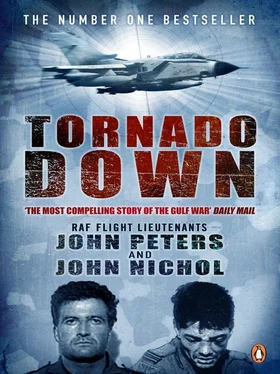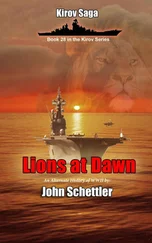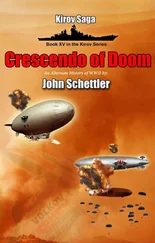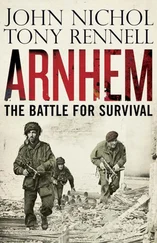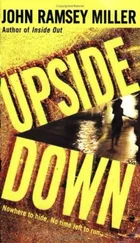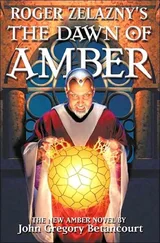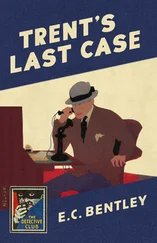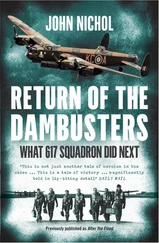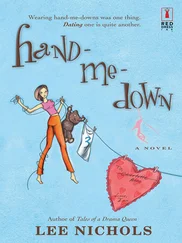‘As long as it was my own balls,’ I rejoined, ‘but I’m not having your balls sewn into my mouth! My own, yes. Yours, no.’
We carried on this semi-serious conversation later, at JP’s place, with Helen. One problem, we decided, was that the new regulation issue 7.65-mm Walther pistols were so weedy, the bullets would only sting us if we fired them at our heads (‘Gosh, that hurt!’), unlike the massive old Browning 9-mm, standard issue until recently, which would, as the man said, ‘Blow your head clean off. Appropriately enough, given our lengthy conversation about testicles, we had been practising with the Walthers that very day, using air-filled condoms, tied to posts, as the targets. Helen said that the prospect of having JP’s balls anywhere near you, without having asked for them, was enough to make anyone shoot themselves. So that decided it: suicide.
There was quite a lot of discussion in the bar about the ethics of war, about how we felt about going to war. Non-RAF friends in particular would ask, ‘How do you feel about killing – or about getting killed yourselves?’
The answer was very simple: we had taken the Queen’s shilling. We had been trained, at enormous expense to the British taxpayer, about £ 3 million per head, or some such mind-bending figure, to do a job. We had led a pretty nice life in the Air Force, varied as to experience, with good prospects, good mates, an adequate income, and plenty of travel. But in the end we were professionals. Going to war was part of the job. It came with the turf, as the Americans say. The taxpayers had to have some return for all that money they had pumped into us – something more than our shining presence at airshows. Yes, it was a shock, and, no, we had never expected to fight, but that fact, the simple fact of being a professional, with a job there to be done, that was for us the overriding factor in the whole business. This attitude, which may seem cynical or even callous, was hard for some of our friends to grasp. It is the difference between random feelings about war – the sort of feelings people outside military life might have – and the attitude of aircrew like ourselves, to whom war is something they have to train for day after day. It was our duty. Having said that, many people wanted to use their training for real. They were extremely pissed off when they were unable to deploy to the Gulf with the rest of us. There just weren’t that many aircrews needed. But guys were trying to delay postings, or get out of courses, so they could come with us.
Some people questioned the rights and wrongs of our involvement in the Kuwaiti cause, though. As one guy put it, ‘What if Kuwait exported bananas, instead of oil?’ These days in the RAF it was no longer a matter of ‘Theirs not to reason why, theirs but to do and die…’ People asked if the West was right to intervene. Would it not be better left to the Arab nations to sort out? There were almost as many different opinions on this subject as there were voices to express them. For one or two guys, it was wrong in principle that we should be taking part in a war when we weren’t defending Queen and Country. To others, Saddam Hussein was a kind of second Hitler, with the mass gassing of Kurdish villagers and a long list of other well-documented crimes against humanity on his conscience. He had to go.
On 2 December, we finally got our marching orders – the big move to Bahrain. The twelve aircraft of XV Squadron had been divided into two nights: the eight that had already gone out to the Gulf with 14, 17(F) and 31 Squadrons and our own remaining formation of four Tornados. We would be the last to go out. Just before leaving, we had the Squadron Children’s Christmas Party. This was always fun. But we suddenly realised that this year there was one very bad fairy at the feast: the Walthers. There we were, walking around on a Sunday afternoon, about to attend a kiddies’ Christmas bash, with our guns and holsters strapped to our shoulders. Not really in keeping with the spirit of the occasion, pistols – just a touch out of place among the chocolate rice cakes, the Twiglets, the jelly and the balloons. We popped into the mess for lunch, just before the party was due to start. Helen was there with the children, Toni and Guy. She had Toni’s pram with her, so we whipped off the shoulder-holsters with the pistols in them and hid everything in the pram, under the blankets with the baby.
That afternoon, straight after the party, we shipped out. This was the hardest thing we had done so far – much harder than the night tanking in pairs! We had verified the life-insurance policies, made the wills, telephoned our relatives, written the letters. JP had given Helen one of her Christmas presents, some exotic lingerie. All of this made for an extended goodbye. But saying those farewells, sitting there in the Sherpa van that would speed us down to RAF Wildenrath and our flight to the Gulf – that was a bit of a choker. Some of us, even if it were only one or two of us, would not be coming back. The odds were not in our favour. It was hard to swallow, looking at Helen and the other wives, and at the kiddies all excited in their pretty party clothes, clutching their precious new toys, and thinking that we might be looking our last. People veered between tears and jokes, but the predominant reaction, from the male side at least, was a sort of hollow bravado. Some people cracked a few beers to help them through the pain of parting. It was four o’clock in the afternoon when the transport set off.
John Peters: The Tornados had already been flown out to the Gulf, because there were far more aircrew going out than there were aircraft. We were travelling there in slower, more stately style – by Hercules transport. This great, lumbering, bone-shaking beast of an aircraft didn’t really take a lifetime to reach Bahrain, it just felt like it. It took about eighteen hours, in fact, including a refuelling stop at Akrotiri in Cyprus.
Having a large RAF base at Akrotiri was a spot of luck for the British military push. Akrotiri is strategically located almost exactly halfway between the UK and the Gulf. It became the key British staging-post in the massive logistical effort required to move whole squadrons of aircraft, their stores and supplies, and whole regiments of armour and infantry, the 3,000 air miles between the two places. Over the course of the next few months, Akrotiri handled about ten years’ worth of normal peacetime air transport traffic.
Typically, John bagged himself just about the only place to lie down in the Here, on a stretcher, sandwiched in amidst all the baggage and paraphernalia of war, and was quickly snoring his head off. I unfurled a crafty sleeping-bag, and tried to get some rest on the shuddering metal floor. The noise was deafening, the discomfort arse-numbing. There was nothing to do. As for cabin service, it consisted of a white cardboard box with a sandwich in it and a KitKat bar – that was your lot, mate! Military airlines! At least we couldn’t hear John snoring.
It was three o’clock in the morning when we reached Akrotiri; the airfield was pretty quiet. Our second stop, Tabuk, way up in northern Saudi Arabia near the border with Iraq, was anything but quiet. Row upon row of US Air Force F-15s and F-16s stretched away into the distance, shimmering in the heat, along with dozens of Saudi Air Force F-5s, the aircraft in neat serried ranks, all fully armed and fuelled up, just sitting there waiting for the war to begin. Ground-crews were swarming around them. The sight of all these aircraft, confidently lined up, made us suddenly realise the enormous scale of the military operation we were joining, its unprecedented international nature. We refuelled for the last leg to Bahrain.
Читать дальше
